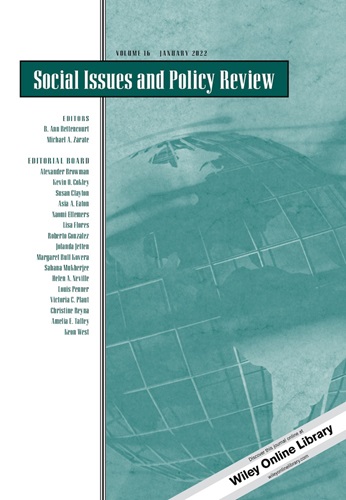Understanding and Addressing Gender‐Based Inequities in STEM: Research Synthesis and Recommendations for U.S. K‐12 Education
IF 5.6
1区 心理学
Q1 PSYCHOLOGY, SOCIAL
引用次数: 6
Abstract
We draw from ecological systems and social psychological theories to elucidate macrosystem-and microsystem-level variables that promote and maintain gender inequities in science, technology, engineering, and math (STEM). Because gender-STEM stereotypes undermine girls’ (and women’s), but boosts boys’ (and men’s), STEM interest and success, we review how they operate in STEM learning environments to differentially socialize girls and boys and undermine gender in-tegroup relations. We propose seven practice recommendations to improve STEM K-12 education: (1) design relational classrooms, (2) teach the history of gender inequality and bias, (3) foster collaborative and cooperative classrooms, (4) promote active learning and growth mindset strategies, (5) reframing STEM as inclusive, (6) create near-peer mentorship programs, and (7) re-imagine evaluation metrics. To support these practice recommendations, three policy recommendations are posited: (1) increase teacher autonomy, training, and representation,理解和解决STEM中基于性别的不平等:美国K-12教育的研究综述和建议
本文章由计算机程序翻译,如有差异,请以英文原文为准。
求助全文
约1分钟内获得全文
求助全文
来源期刊

Social Issues and Policy Review
Multiple-
CiteScore
22.20
自引率
1.10%
发文量
9
期刊介绍:
The mission of Social Issues and Policy Review (SIPR) is to provide state of the art and timely theoretical and empirical reviews of topics and programs of research that are directly relevant to understanding and addressing social issues and public policy.Papers will be accessible and relevant to a broad audience and will normally be based on a program of research. Works in SIPR will represent perspectives directly relevant to the psychological study of social issues and public policy. Contributions are expected to be review papers that present a strong scholarly foundation and consider how research and theory can inform social issues and policy or articulate the implication of social issues and public policy for theory and research.
 求助内容:
求助内容: 应助结果提醒方式:
应助结果提醒方式:


